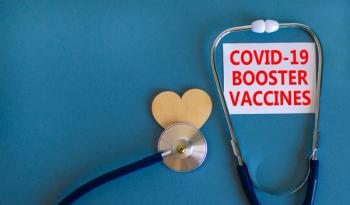
Ultrasound Reveals Liver Injuries in Patients After COVID-19 Infection
Liver stiffness can increase in patients with a history of COVID-19 infection. The use of ultrasound shear wave elastography showed a significant increase in stiffness.
Liver stiffness can increase in patients with a history of COVID-19 infection. According to results of a new study that were presented today at the annual Radiological Society of North America (
Results from the retrospective study revealed that signs of stiffness appeared in the ultrasounds at 44 weeks after a COVID-19 diagnosis in comparison to pre-pandemic and pandemic controls.
“Our study is part of emerging evidence that COVID-19 infection may lead to liver injury that lasts well after the acute illness,” said Firouzeh Heidari, M.D., a post-doctorate research fellow at Massachusetts General Hospital in Boston, in a RSNA release.
Liver stiffness is a marker of liver damage, such as inflammation or fibrosis - a buildup of scar tissue in the liver. Over time, healthy liver tissue diminishes, and the liver can no longer function properly. Progressive fibrosis can lead to liver cancer and liver failure. However, elevated transaminases (enzymes that indicate liver dysfunction) in patients with COVID-19 suggest the presence of liver injury during acute infection, but whether this injury leads to lasting liver damage remains unknown, the release said.
Researchers of the study compared liver stiffness of 131 patients at Massachusetts General Hospital with a history of COVID-19 infection to two control groups. All patients underwent the ultrasound imaging between 2019 and 2022. The process of shear wave elastography is a technique where sound waves measure the stiffness of tissue.
Patients were assesed into three groups based on when they underwent elastography and whether they tested positive for COVID-19. The COVID-19 positive group contained 31 patients who had a positive COVID-19 PCR test result at least 12 weeks before their elastography exam. The pandemic control group consisted of a random sample of 50 patients who underwent elastography during the COVID-19 pandemic and had a history of only negative COVID-19 PCR test results. Lastly, the pre-pandemic control group consisted of a random sample of 50 patients who underwent an elastography exam prior to the COVID-19 pandemic.
The average age for COVID-positive patients was was 53.1 years, 55.2 years for the pandemic control group and 58.2 years for the pre-pandemic control group. Of the total cohort, 67 were women. COVID-positive patients also had a higher median live stiffness (7.68 kPa) than pandemic control patients (5.99 kPa). In additon, the pre-pandemic control group had a higher median stiffness (7.01) compared to pandemic control group. Additionally, patients referred for elastography before the pandemic were noted to be older than patients referred after the start of the pandemic.
"We are currently investigating whether the severity of acute COVID-related symptoms is predictive of long-term liver injury severity," Heidari said. "We hope to enrich our existing database with additional patient data and a broader scope of co-variates to better understand the post-acute effects of COVID-19 within the liver.”
Newsletter
Get the latest industry news, event updates, and more from Managed healthcare Executive.























